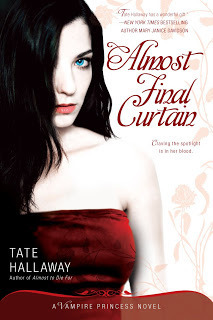Kelly McCullough's Blog, page 77
December 8, 2010
Our Tax Dollars At Work At NASA

The robotic rover Opportunity has chanced across another small crater on Mars. Pictured above is Intrepid Crater, a 20-meter across impact basin slightly larger than Nereus Crater that Opportunity chanced across last year. The above image is in approximately true color but horizontally compressed to accommodate a wide angle panorama. Intrepid Crater was named after the lunar module Intrepid that carried Apollo 12 astronauts to Earth's Moon 41 years ago last month. Beyond Intrepid Crater and past long patches of rusty Martian desert lie peaks from the rim of large Endeavour Crater, visible on the horizon. If Opportunity can avoid ridged rocks and soft sand, it may reach Endeavour sometime next year.
Published on December 08, 2010 15:17
December 3, 2010
Friday Cat Blogging
What do you mean I'm supposed to move once in a
while so the audience at home will know I'm not dead?

Go way or I burnz you with my half-open lazer eyez!

Artistic cat is deep and brooding.

I want to brush my teefs like the big kidz!


while so the audience at home will know I'm not dead?

Go way or I burnz you with my half-open lazer eyez!

Artistic cat is deep and brooding.

I want to brush my teefs like the big kidz!

Published on December 03, 2010 09:43
Misconceptions about Publishing
This is an interesting article about Common Misconceptions about Publishing.
This one is my favorite, as it makes me feel a LOT better about being mid-list:

This one is my favorite, as it makes me feel a LOT better about being mid-list:
"1. It's all about the front list.
The front list gets all the attention because new things almost always do and the books on the front list are by definition new. Also, an editor's reputation may live and die with her choices of what to publish next. But a publisher's real asset — the majority of its good will, in business parlance — is the backlist, those books that deliver steady sales year in and year out. It's the ballast in the ship, the revenue that keeps the lights on. It's the main reason why some entity would bother to buy an existing publishing house at all. And the absence of a backlist is the reason why newly formed publishers often prove short lived, even despite occasional front list success."
Published on December 03, 2010 07:37
December 2, 2010
Alien Life Found...
...on Earth.
Gizmoto breaks the news that NASA will be announcing a new form of life completely alien to anything else on earth has been discovered. It is a bacteria living in Mono Lake, California whose DNA chain includes/is based on arsenic (let the scientists explain it).
Gizmoto breaks the news that NASA will be announcing a new form of life completely alien to anything else on earth has been discovered. It is a bacteria living in Mono Lake, California whose DNA chain includes/is based on arsenic (let the scientists explain it).
Published on December 02, 2010 06:32
December 1, 2010
Timing
In case someone out there wonders about the timing of book production. I got the cover art for ALMOST FINAL CURTAIN on Monday, and turned in the copy edits today. I often see cover art before the book is "done" (though never before I turn in the book.)
Next, I'll see the readers' proof, which may or may not become a galley/ARC, depending on how invested the publisher is in the book's success. And, yes, I have had books that have NOT had galleys made (which means no reviews from any print publication that needs a lead time of a couple of months or more, like Romantic Times, Library Journal, etc.)
All the while, I'm working on the next book in the series, which is due in April a month before ALMOST FINAL CURTAIN hits the stores.
Next, I'll see the readers' proof, which may or may not become a galley/ARC, depending on how invested the publisher is in the book's success. And, yes, I have had books that have NOT had galleys made (which means no reviews from any print publication that needs a lead time of a couple of months or more, like Romantic Times, Library Journal, etc.)
All the while, I'm working on the next book in the series, which is due in April a month before ALMOST FINAL CURTAIN hits the stores.
Published on December 01, 2010 10:19
November 29, 2010
New Tate Cover

Here it is, the cover for Ana's second installment, called ALMOST FINAL CURTAIN, which I like to describe as Glee meets Vampire Diaries. It is due out in stores May 2011!
So.... what do you think??
Published on November 29, 2010 09:02
November 26, 2010
Friday Cat Blogging
One radiator in the sun = 4 cats

Walrus on a fuzzy reef

I am the very model of modern feline general…

Because the sun shines on those who rule, of course.

I can haz?

I can HAZ!



Walrus on a fuzzy reef

I am the very model of modern feline general…

Because the sun shines on those who rule, of course.

I can haz?

I can HAZ!

Published on November 26, 2010 06:35
November 20, 2010
Why to Belong to a Writers Group
This being the Internet, and many, many writers participating in this bloggy medium, I'm under no illusions that this is the first blog post about belonging to a writers group, and the whys and wherefores thereof. That said, one of the questions that regularly comes up when writers are talking to members of the Wyrdsmiths is what we find so valuable about being in a writers group.
Here's a list of a few reasons why I think writers group are the way to go for writers who want to be published. This is not meant to be the ultimate, all-inclusive list; I'm quite sure that other members of Wyrdsmiths have items that should be added to this list. But it's been a while since I've seen a somewhat definitive set of reasons why being in a writers group matters. Especially if you are working toward publication, though many of these reasons hold for writers who are writing for enjoyment, or therapeutically, too.
1. Edits/Critique: It practically goes without saying that stories need to be edited; almost no one will ever write a first draft, send it in, have it published, and receive universal praise for their story. Editing is the polish that makes the gem shine. It is the process by which a story grows into adulthood and comes into its own sense of being.
There are two reasons this category is important. First, as a group of writers get to know each other, they build something that is fantastically important in the critique process: trust. Trust is the element of belong to a writers group that allows a writer to move beyond the careful protections we erect against the barbs, purposeful or unwitting, that others throw at us when we share our stories, and by virtue of that, ourselves, to their commentary. Trust allows us to really listen to the suggestions that other writers are making about our story and how to improve it, which in turn allows us to become better writers as we integrate those suggestions into our writing styles.
Second, a sad reality of the modern publishing world is that as publishers contract their editorial staffs, less and less time can go into traditional editing, which in turn means that more of the burden of improving the text lies with the author. Anyone who has written for any length of time can attest that editing and revising your own text can be difficult; internal biases and a deep understanding of the intent behind what you have written interfere with seeing clearly what a fresh reader will take from the text. And after a number of times through the text, you've seen the story so much that you really aren't reading it any more. A writers group is extraordinarily valuable in bridging that editorial need, which in turn improves the chances of your story wending its way to market.
2. Learning from Others: It has been said, innumerable times, that the most important things to do to become a successful author are to write, and to read what you want to write. (I won't get into luck, which is also at times an essential ingredient in the publication process.) Without getting all Vygotsky and Zone of Proximal Development, I would suggest that a hugely valuable subset of the reading and writing learning process is watching other people writing with a similar goal (publication, enjoyment, therapy, etc.) and learning from their mistakes and successes. You know, as you are reading a story, those "AHA!" moments that help you recognize things that work or don't work in a story, and as you build up time in that learning process, you also learn how those learning moments translate from that particular story to a more general rule about writing. These rules are not always the same for everyone, though I'll say that there are a host of them that are--and being in a writers group can help accelerate the learning curve dramatically, because a group of people sitting around discussing those moments in detail will often hash out more thoroughly and effectively exactly what to take away from a particular piece than a single person will on their own. No one person is going to have had as many of the experiences and biases that inform and shape a reading as a group of people will. And knowing what people are reading--or not reading--when they see a particular piece of text is an extremely valuable tool in honing your storytelling skills.
3. Accountability: There's nothing to get you writing, and keep you writing, like feeling that other people with whom you have a relationship are expecting you to be writing. Writing can be a very difficult process, emotionally and temporally; we all lead busy, hectic lives, and finding the time and energy to put into writing is often a struggle. It becomes very easy, once that momentum has slipped, to make excuses as to why you can't find time, or that other items (like housework/yardwork, ahem, ahem) get in the way. Being in a writers group provides a structured expectation that you will participate by sharing some of your writing, whether it be a minimum page count or a very general sense that every so often, everyone should be turning in something to the group. When your internal motivation flags--and it will, at some point or another--having the expectations from other people to whom you are accountable can be the boost you need to put butt in seat and keep going.
4. Camaraderie: Writing, like running, is a solitary endeavor. No one else can write your stories for you, and no one else will. Often, the people in our lives who are closest to us do not have a sense of how important the time we spend writing is. If they aren't writers, then they often don't have a frame of reference for why we need to go sit in a room by ourselves, undisturbed, and string words together. We might as well be playing video games, as far as they are concerned.
The company of other writers is a welcome balm to the struggles of making time and carving out energy to write, not to mention the associated difficulties that money, children, sickness--all of the many stressors of living--throw into the path of a writing life. Other writers are going through the same thing, or similar things, as you are, or they know other writers who have. Getting together with specified regularity allows you to know that you will have someone to talk to soon about something that is stressing you out or interfering with your writing. And having a network of people who get what you're trying to accomplish can allow you to call or email one of them if you need to work through something sooner than the next meeting, so you can get back to writing.
5. Industry Gossip: This one is really aimed at writers working toward publication. Also, this takes time to develop. One of the most valuable elements of being in a writers group where everyone is working toward publication is the sharing of industry gossip. What agents are good to work with, which houses are accepting material, which magazines are having trouble paying their authors, where a particular editor has gone... the shop talk of professional writing. You can't spend all of your time following a complex, perpetually moving industry--if you did, you wouldn't be writing, which is the whole point in knowing anything about the industry. But a group of people who are writing and sending out material are going to get feedback, and learn things about the industry, and as they become more successful they will get agents and editors, and they will develop connections with other writers outside of the group, and all of that networking will start to yield catch.
Knowing that kind of information can allow you to target your submissions more effectively, which in turn will improve your chances of publication. If your goal is to become a published author, knowing the industry you want to work in is undoubtedly a wise course of action.
___
Is this a complete list? I doubt it. But it lays out some of the major reasons for finding or forming a writers group. Are there reasons not to belong to a writers group? Yes, absolutely. Do they sufficiently outweigh the advantages? Personally, I don't think so. You might. But I would strongly encourage you to try the writers group path before you discount it--you may find over a very few years that your writing improves dramatically, and that can only help you in the long run.
Here's a list of a few reasons why I think writers group are the way to go for writers who want to be published. This is not meant to be the ultimate, all-inclusive list; I'm quite sure that other members of Wyrdsmiths have items that should be added to this list. But it's been a while since I've seen a somewhat definitive set of reasons why being in a writers group matters. Especially if you are working toward publication, though many of these reasons hold for writers who are writing for enjoyment, or therapeutically, too.
1. Edits/Critique: It practically goes without saying that stories need to be edited; almost no one will ever write a first draft, send it in, have it published, and receive universal praise for their story. Editing is the polish that makes the gem shine. It is the process by which a story grows into adulthood and comes into its own sense of being.
There are two reasons this category is important. First, as a group of writers get to know each other, they build something that is fantastically important in the critique process: trust. Trust is the element of belong to a writers group that allows a writer to move beyond the careful protections we erect against the barbs, purposeful or unwitting, that others throw at us when we share our stories, and by virtue of that, ourselves, to their commentary. Trust allows us to really listen to the suggestions that other writers are making about our story and how to improve it, which in turn allows us to become better writers as we integrate those suggestions into our writing styles.
Second, a sad reality of the modern publishing world is that as publishers contract their editorial staffs, less and less time can go into traditional editing, which in turn means that more of the burden of improving the text lies with the author. Anyone who has written for any length of time can attest that editing and revising your own text can be difficult; internal biases and a deep understanding of the intent behind what you have written interfere with seeing clearly what a fresh reader will take from the text. And after a number of times through the text, you've seen the story so much that you really aren't reading it any more. A writers group is extraordinarily valuable in bridging that editorial need, which in turn improves the chances of your story wending its way to market.
2. Learning from Others: It has been said, innumerable times, that the most important things to do to become a successful author are to write, and to read what you want to write. (I won't get into luck, which is also at times an essential ingredient in the publication process.) Without getting all Vygotsky and Zone of Proximal Development, I would suggest that a hugely valuable subset of the reading and writing learning process is watching other people writing with a similar goal (publication, enjoyment, therapy, etc.) and learning from their mistakes and successes. You know, as you are reading a story, those "AHA!" moments that help you recognize things that work or don't work in a story, and as you build up time in that learning process, you also learn how those learning moments translate from that particular story to a more general rule about writing. These rules are not always the same for everyone, though I'll say that there are a host of them that are--and being in a writers group can help accelerate the learning curve dramatically, because a group of people sitting around discussing those moments in detail will often hash out more thoroughly and effectively exactly what to take away from a particular piece than a single person will on their own. No one person is going to have had as many of the experiences and biases that inform and shape a reading as a group of people will. And knowing what people are reading--or not reading--when they see a particular piece of text is an extremely valuable tool in honing your storytelling skills.
3. Accountability: There's nothing to get you writing, and keep you writing, like feeling that other people with whom you have a relationship are expecting you to be writing. Writing can be a very difficult process, emotionally and temporally; we all lead busy, hectic lives, and finding the time and energy to put into writing is often a struggle. It becomes very easy, once that momentum has slipped, to make excuses as to why you can't find time, or that other items (like housework/yardwork, ahem, ahem) get in the way. Being in a writers group provides a structured expectation that you will participate by sharing some of your writing, whether it be a minimum page count or a very general sense that every so often, everyone should be turning in something to the group. When your internal motivation flags--and it will, at some point or another--having the expectations from other people to whom you are accountable can be the boost you need to put butt in seat and keep going.
4. Camaraderie: Writing, like running, is a solitary endeavor. No one else can write your stories for you, and no one else will. Often, the people in our lives who are closest to us do not have a sense of how important the time we spend writing is. If they aren't writers, then they often don't have a frame of reference for why we need to go sit in a room by ourselves, undisturbed, and string words together. We might as well be playing video games, as far as they are concerned.
The company of other writers is a welcome balm to the struggles of making time and carving out energy to write, not to mention the associated difficulties that money, children, sickness--all of the many stressors of living--throw into the path of a writing life. Other writers are going through the same thing, or similar things, as you are, or they know other writers who have. Getting together with specified regularity allows you to know that you will have someone to talk to soon about something that is stressing you out or interfering with your writing. And having a network of people who get what you're trying to accomplish can allow you to call or email one of them if you need to work through something sooner than the next meeting, so you can get back to writing.
5. Industry Gossip: This one is really aimed at writers working toward publication. Also, this takes time to develop. One of the most valuable elements of being in a writers group where everyone is working toward publication is the sharing of industry gossip. What agents are good to work with, which houses are accepting material, which magazines are having trouble paying their authors, where a particular editor has gone... the shop talk of professional writing. You can't spend all of your time following a complex, perpetually moving industry--if you did, you wouldn't be writing, which is the whole point in knowing anything about the industry. But a group of people who are writing and sending out material are going to get feedback, and learn things about the industry, and as they become more successful they will get agents and editors, and they will develop connections with other writers outside of the group, and all of that networking will start to yield catch.
Knowing that kind of information can allow you to target your submissions more effectively, which in turn will improve your chances of publication. If your goal is to become a published author, knowing the industry you want to work in is undoubtedly a wise course of action.
___
Is this a complete list? I doubt it. But it lays out some of the major reasons for finding or forming a writers group. Are there reasons not to belong to a writers group? Yes, absolutely. Do they sufficiently outweigh the advantages? Personally, I don't think so. You might. But I would strongly encourage you to try the writers group path before you discount it--you may find over a very few years that your writing improves dramatically, and that can only help you in the long run.
Published on November 20, 2010 08:56
November 19, 2010
Friday Cat Blogging
Whazza?

You haven't fed me, I hate you.

No man, I'm like this all the time, no chemicals involved.
Why do you ask?

Rarraayaawn



You haven't fed me, I hate you.

No man, I'm like this all the time, no chemicals involved.
Why do you ask?

Rarraayaawn

Published on November 19, 2010 12:29
November 18, 2010
The Idoru, She Is Real
Published on November 18, 2010 11:04
Kelly McCullough's Blog
- Kelly McCullough's profile
- 369 followers
Kelly McCullough isn't a Goodreads Author
(yet),
but they
do have a blog,
so here are some recent posts imported from
their feed.



